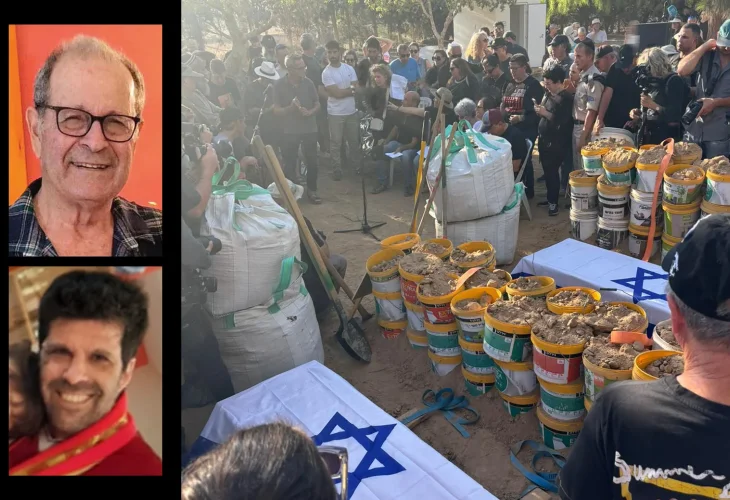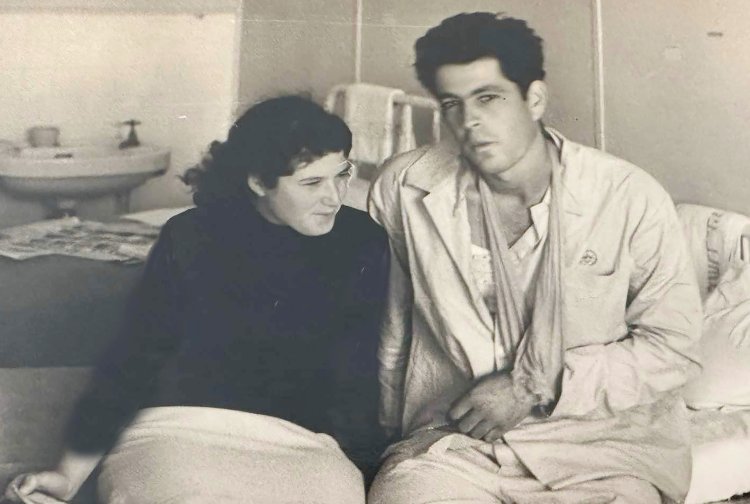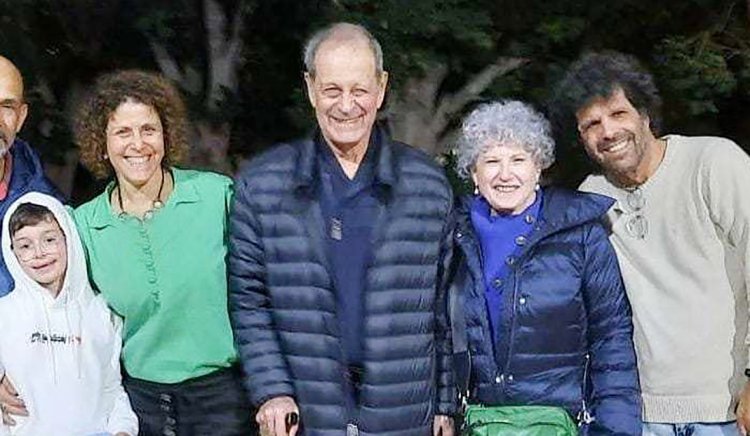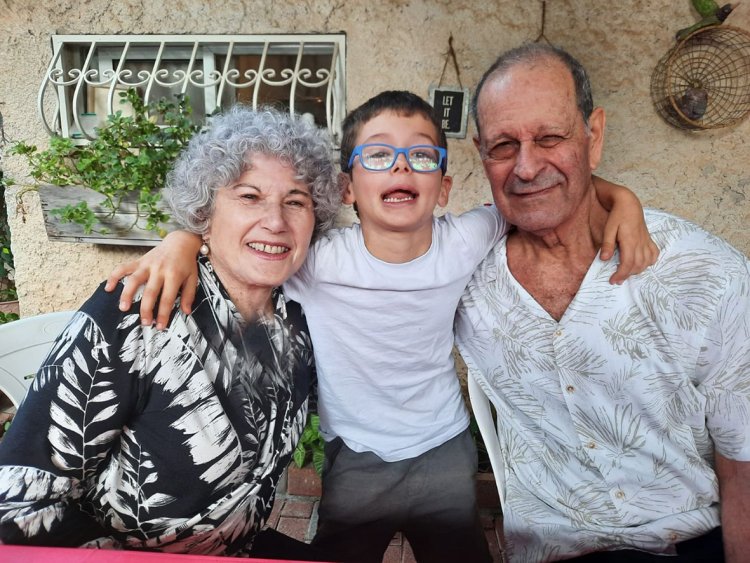Tragic Tales of Capture: An American Kibbutz Family's Struggle
Mere weeks after learning her uncle was killed in captivity, Merav Mor-Raviv sits down for an emotional interview. "People don't understand, but these captives are experiencing something akin to a Holocaust."
 The funeral of Avraham Mondar and his son Ro'i. Inset: Avraham and Ro'i
The funeral of Avraham Mondar and his son Ro'i. Inset: Avraham and Ro'iAbout two weeks ago, something tragic happened: At Kibbutz Nir Oz, the community awoke to the sorrowful news of the death in captivity of their friend, Avraham Mondar, 79, who had been kidnapped from the kibbutz and held in Gaza for over ten months. This news arrived alongside the announcement of the retrieval of five other captives' bodies. Unlike the others, whose deaths had been previously reported, Mondar's family only received definite confirmation at that time that their loved one was not among the living.
"People hear about a 79-year-old and think it's just an old man at the end of his life, but they probably didn't know my uncle," says Merav Mor-Raviv, Mondar's niece. "Avraham worked at the Nirlat company and never retired. He was a family man who loved to sing and talk, very gentle and modest. It's hard to speak about him because I know he wouldn't want to be highlighted. By the way, during the captivity period, we avoided publicity, fearing it could harm him. In the past, he was a paratrooper and part of Battalion 55 that fought in the liberation of Jerusalem in the Six-Day War, and he was wounded in that battle."
 Mondar after the injury in the Six-Day War
Mondar after the injury in the Six-Day War"We Refused to Accept Reality"
Mondar was one of the veterans of Kibbutz Nir Oz, arriving there with his wife Ruti shortly after they married. He lived there for decades, where his children were also born—his son Ro'i, who was murdered on Simchat Torah, and his daughter Keren, who was kidnapped along with her mother Ruti during the same attack.
"In recent years, life wasn't easy for Avraham," notes Mor-Raviv. "He struggled with the rocket fire and sirens, especially since he suffered from PTSD due to his injury in the Six-Day War. About fifteen years ago, he survived a direct hit at the Nirlat factory where he worked, while the worker beside him was killed. Despite everything, he never thought of leaving the kibbutz or his job. To him, those were his life, and he loved them."
Recounting the events of Simchat Torah, Mor-Raviv shares, "Avraham and Ruti were at home on the kibbutz, hosting their daughter Keren and her then 9-year-old son Ohad. When terrorists entered their home, Avraham did everything he could to prevent them from breaking into the safe room, but they breached the door, throwing him to the ground, leaving him barely able to move. Throughout the 49 days Keren, Ruti, and Ohad were in captivity, they couldn't stop thinking about him, not knowing his condition or whereabouts. Only upon their release, while in a Red Cross ambulance, Margalit Moses informed them she had been with Avraham, and he was captive. At that time, they assumed he too would return in a few days. They couldn't believe he would remain captive for such a long period.
"Later, we received further signs of life from Avraham, including through one of the nurses from Soroka who was kidnapped and held captive. She said she cared for all the older captives, including Avraham, and we heard from other captives who met him. We constantly hoped he'd come back alive, but about three months ago, five families of captives were informed their loved ones were murdered, while we were warned of potential danger to Avraham's life. We are realistic people and understood the gravity of the situation. Nonetheless, Ruti refused to accept the reality. She always insisted that until told otherwise, he was alive in her eyes."
But how did he survive for so many months given his age and harsh circumstances?
"Honestly, I can't explain it. Testimonies from other captives suggest they endured horrendous conditions—in tunnels, with hardly any air. They barely had food, and as we understand, Avraham mostly lay on a mattress, barely rising due to severe balance issues. But reality shows he survived because life's force is stronger, and he undoubtedly dreamed of reuniting with his family. We know he learned through Al Jazeera that Keren, Ruti, and Ohad were released, and we hope it brought him some comfort. It pains us because there were many missed opportunities to bring him back."
 Mondar family in better days
Mondar family in better days"We Feared a Military Operation"
Ruti, Keren, and Ohad were released in the first stage of the deal, but Avraham was buried instead. This hasn't stopped Mor-Raviv from tirelessly advocating for the captives, traveling abroad to speak wherever possible.
"There's no time," she says painfully. "Sadly, as we saw this week, six captives were likely murdered just days before they were found due to terrorists fearing a rescue operation. It means the terrorists preferred to die with the captives rather than let them be rescued. It turns out the existential danger hovered over them from day one, as Daniel Aloni, a released captive, recounted: A gunman with a drawn weapon entered their room and stayed for more than 48 hours, explaining that if there were a rescue operation, he would kill them all.
"Even my cousin Keren, who spoke with her brother after returning, was told, 'Every morning I hoped to hear about a heroic rescue operation in the night,' to which Keren replied, 'Every night, I went to sleep hoping such an operation wouldn't happen because I knew we would all be killed.' Keren also told me they understood they were at high risk, being kept in a single room with a doctor—ten people between ages two and eighty-five, in a room meant for a single patient. If anyone tried to rescue them, it was clear they'd be immediately harmed.
"Moreover, Almog Mayir Jan, who was rescued alongside Shlomi Ziv, Andrei Kozlov, and Noa Argemani, told us that just before his rescue, Alex Lovanov, z"l, was separated and told he'd soon be released as he appeared on the list. They told him to 'shower and shave,' and then moved him to a tunnel where the five murdered captives were found this week. Some appeared on the release list. It's chilling that those separated were rescued, but he was murdered."
Do you think some of those murdered knew they were to be released?
"I'm not sure, but Alex certainly hoped because he was separated for release."
 Ohad Mondar with Grandpa Avraham and Grandma Ruti
Ohad Mondar with Grandpa Avraham and Grandma RutiNever Stop Believing
Last month, the Mondar family received the dreadful news of Avraham's death in captivity. "Army officers came to tell Ruti and Keren, while an officer called me to notify my parents, my siblings, and my aunt—Avraham's younger sister. Some told us, 'At least there's closure, a grave you can visit,' but we find no comfort in that. Avraham was taken alive and should have returned alive, not in a coffin."
The funeral held at Kibbutz Nir Oz was hauntingly difficult, also marking the opportunity to properly bury Ro'i, Avraham's son, on kibbutz soil. "This was the closest family's first chance to attend the funeral, as they were captives before," explains Mor-Raviv, "The initial identification of Ro'i's body was challenging as there was no DNA available—all family members were captive."
These are unbelievable and harsh stories...
"True. Holocaust survivors might disagree with equating this to a Holocaust—and rightly so, as the Simchat Torah attack lasted a day, while the Holocaust dragged on for years. But the experiences of captives in such conditions are akin to a Holocaust. I meet former captives who share horrific tales beyond description. It’s not just the actions or events; it’s the essence, as my cousin Keren said, 'In captivity, you lose your entire identity; you have no decisions, living in complete uncertainty about what might happen next.' Keren described how they survived together in a small room, hearing terrorists tell the children repeatedly, 'You will grow up and marry here in Gaza, there’s no country, no kibbutz.' These children lost close family and some still don't know what happened to their relatives. What is it, if not resembling a Holocaust? We must do everything possible to rescue those still captive. They can't remain there even one more day."
Do you have an idea of how to accomplish this?
"I can only offer my personal opinion: I believe a deal must be signed urgently, understanding that the value of life and the mitzvah of redeeming captives outweighs territorial interests. We must sanctify life over death. When told certain lands are 'strategic assets,' it pains me. My uncle was a strategic asset, as are the 101 captives still in Gaza. How can we abandon them?"
After so many failed attempts at a deal, are you still hopeful it can happen?
"I try to remain optimistic, even if it’s challenging. In conversations with other families, we jokingly say we’ll keep shouting ‘now, now’ and still believe it, but I refuse to stop believing and hoping. We can't lose that hope, especially since survivors still hope for rescue; we cannot give up."

